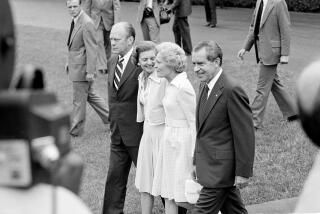The revolving door spins faster: Ex-Congressmen become ‘stealth lobbyists’
Legal and legislative restrictions on Washington’s infamous revolving door always come with grand ambitions and grandiose titles. The most important statute limiting lobbying by former senators and representatives, for instance, was dubbed the “Honest Leadership and Open Government Act” when it was signed by President George W. Bush in 2007.
The law prohibited ex-senators and top executive branch officials from lobbying Congress for two years after their Capitol Hills service ended; former Representatives had to wait one year. Then-Sen. Barack Obama called it “the most sweeping ethics reform since Watergate.”
If that’s so, the bar must have been set pretty low. A joint study published Tuesday by the Center for Responsive Politics and the Sunlight Foundation reveals that of the 104 former federal legislators and staffers whose restrictions ended in time for Tuesday’s opening of the 114th Congress, 29 are already in government relations,”public affairs,” or employed as counsel to lobbying-oriented law firms. But only 13 of them are formally registered as lobbyists.
The Honest Leadership Act, as it turned out, didn’t end revolving-door lobbying by former members of Congress or their aides; it just drove it underground into a category the Sunlight Foundation calls “stealth” lobbying. Obama’s executive order extending the two-year lobbying ban to all executive branch appointees taking office after his inauguration didn’t do much to stem the tide.
The act and the executive order merely encouraged former legislators and staffers to avoid registering as lobbyists at all. They could take this tack, the Sunlight Foundation observed last year, because “the definitions of ‘lobbyist’ and ‘lobbying’ suffer from well-recognized loopholes.” To be formally considered a lobbyist, for example, an ex-legislator must be engaged in lobbying activities for 20% of more of his or her time for an individual client. So by spreading their services among many clients, or by providing “strategic advice” rather than “lobbying services,” any ex-lawmaker can evade the ban.
“The shackles, even while they’re on, are more spaghetti than steel,” the Center for Responsive Politics says. The number of registered lobbyists in Washington has declined steadily since the 2007 act was signed (see accompanying graphic); does that mean lobbying by ex-Congressional members has gone away? Hardly.
The Center’s OpenSecrets.org website lists several categories of stealth lobbyists. One is lobbyists-in-waiting: “Because there’s no ban on the background and other work that supports lobbying efforts ... and no ban on forming a lobbying firm, lawmakers and staffers are free to join lobbying shops or hang out their own shingles even while they are in their cooling-off period.”
Others simply define the concept of lobbyist out of existence. Chris Dodd ended his 30 years of service as a Democratic U.S. senator from Connecticut on Jan. 3, 2011; 10 weeks later he became chairman and CEO of the Motion Picture Assn. of America, Hollywood’s lobbying arm. Does that make him a “lobbyist”? Apparently not.
The revolving door is always spinning for pedestrians of potential influence. Law firms in Washington aren’t ashamed at promoting their rosters of ex-legislative and executive branch employees. Take Covington & Burling, one of the capital’s premier law firms. As the stars of its “Congressional and Federal Agency Advocacy” unit (“advocacy” is a convenient euphemism for “lobbying”), the firm cites “a former Counsel to two Senate Majority Leaders, a Chief of Staff to three separate Members of Congress, a former Chief of Staff to the House Transportation and Infrastructure Committee, a former Special Counsel to the President, a former Deputy Secretary of the Treasury, Under Secretary of State, Under Secretary of Commerce, and White House Domestic Policy Advisor, and many more.”
Among the achievements of this experienced cadre are these: obtaining “retroactive immunity for a group of antitrust defendants,” achieving “a legislative override of a negative agency action,” and obtaining “unprecedented immigration legislation for the citizens of a strong US ally.” In other words, the firm obtained favors for clients who included companies accused of breaking the antitrust law, a client bristling under a government regulatory action, and well-situated would-be immigrants. Do any of these sound like blows in favor of the public interest? You be the judge.
Legislators and government officials will always speak up in favor of ending influence-peddling by former representatives of the people, but action is rare. Last year, Sens. Michael Bennet (D-Colo.) and Jon Tester (D-Mont.) introduced the “Close the Revolving Door Act,” which would impose a lifetime ban on lobbying Congress by any former members. As OpenSecrets.org reports, it died in committee.
Keep up to date with the Economy Hub. Follow @hiltzikm on Twitter, see our Facebook page, or email mhiltzik@latimes.com.







